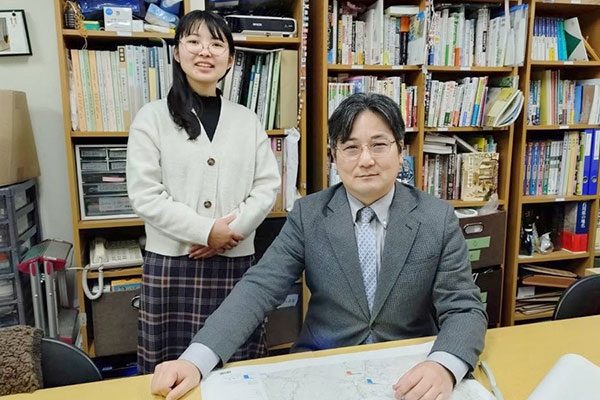Economics and Social Studies Course
Overview
In the modern world, there are two conflicting patterns emerge: convergence through regional integration and the polarization of integrated regions. Although these patterns enhance the development of the global economy, various problems occur at both local and international societaly levels. These problems include conflicts, economic inequality, and environmental issues. In this Course, students will analyze modern societal trends using theories related to economics and business. Students also learn to formulate specific strategies for solving key problems in modern society.
Faculty
| Name | Research Fields | E-mail (* Note2) |
|---|---|---|
| IDE Akira | Tourism Studies (Especially Dark Tourism), Art Management, Social Informatics | akiraide@staff. |
| IKARIYAMA Hiroshi■ | Public Finance, Public Policy | ikari@staff. |
| OHKI Kazuyoshi | Macroeconomics | k-ohki@staff. |
| OZAWA Yuka | Social Policy Theory: Social Policy, Poverty Reduction, Social Exclusion | y-ozawa@staff. |
| KATO Atsuyuki | Applied Econometrics, International Economics, Productivity Analysis, Trade and Growth | akatoecon@staff. |
| KATOU Minehiro | Monetary Theory, Banking Theory | minehir@staff. |
| KANAMA Daisuke | Innovation Theory, Marketing Theory | kanama@staff. |
| KAWASUMI Atsushi | Regional Management: Tourism and Urban Development, Community Development | kawasumi@staff. |
| KIKUCHI, Naoki | Environmental Sociology, Natural regeneration,Ecotourism, Adaptive Governance | nkikuchi@staff. |
| KOBAYASHI Shinsuke | Economic History, Japanese History, Regional History, History of Social Movements, History of Immigration, Popular History | kobashin@staff |
| SAITO Takeshi | International Management, International Human Resource Management | tsaito@staff. |
| SAKAGUCHI Hiromasa | Management Accounting (Healthcare Field) | sakaguchi@staff. |
| SATOU Kiyokazu☆ | Financial Accounting | kiyosato@staff. |
| SATO Hideki | British and French Financial History, European Finance | h-sato@staff. |
| SAMUTA Hikaru | Regional Economics | samuta@staff. |
| SHIRAISHI Hideo | Urban and Architectural Planning, Civil Engineering and Transportation Planning, Community Development | hideoshiraishi@staff. |
| SUZUKI Tomoki | Business Administration | tosuzuki@staff. |
| SEO Takashi | Political Economics, History of Economics, Evolutionary Economics | t-seo@staff. |
| TAKAHASHI Ryoko☆ | Sociology, Welfare and Medical Sociology, Disability Studies, Gender Studies | takahasi@staff. |
| TAKESHIMA Sadaharu | Bookkeeping Accounting, Accounting Systems, Accounting Theory, Accounting History | take470@staff. |
| TANABE Hiroshi | Sociology | tanabeh@staff. |
| CHIBA Yoshihiro | Medical History, Labor History, Agricultural History, Southeast Asian History | hirochiba@staff. |
| ZHANG Jing | Marketing Theory (Service Marketing, Retail Marketing, Customer Understanding, Value Co-Creation) | j-zhang@staff. |
| TSUTSUMI Atsuro | Social Welfare, Public Health, International Mental Health | atsuro@staff. |
| DOI Taeko | Curriculum Theory | tdoi@ed. |
| HAYASHI Naoki | Rural Planning Studies, Ecosystem Services, Rural Planning for Retreat | nhayashi72@staff. |
| FUJISAWA Mieko★ | Applied Microeconomics (Experimental Economics, Urban Economics, etc.) | fujisawa@staff. |
| HOSHINO Nobuaki | Economic Statistics | hoshino@kenroku. |
| MASAKI Toyomu | Economic Development Theory, Economic History of West Africa, Money and Currency, World Political Economy | tmasaki@staff. |
| MAZUMI, Yusuke | Sociology, Global Sociology, International Migration | ymazumi@staff. |
| MANABE Tomoko | Sociology, Community Welfare Services | manabe@staff. |
| MARUYA Kota | Community Design, Cultural Landscape, Traditional Crafts, Landscape Theory | maruya@staff. |
| MURAKAMI Shinji | Social Security, Economic Philosophy | shinji.murakami@staff. |
| MORIYAMA Osamu☆ | Social welfare, Medical Welfare, Care Theory | moriyama@ed. |
| YAMADA Naoko | Interpretation, Heritage Resource Conservation, Sustainable Tourism, Visitor Studies | yamada@staff. |
| YOO JaeKyu☆ | Production Systems, Management Engineering, Supply Chain Management | yoo@staff. |
| WADA Kazuya | Development Economics | kwada@staff. |
Note
- Transfer in Mar 2026 ☆: Mar 2027 ★: Mar 2028 (Not selectable as preferred advisors.)
- Please add “kanazawa-u.ac.jp” after the email address field.
Introduction to the laboratory
The most distinctive feature of our laboratory is that, in addition to conventional research on such issues as “village development” in Japan, we conduct research on “strategic village development” and “village downsizing.” This study examines the possibility of revitalization in an era of a declining population in the country as a whole. Our research is based on agriculture-related civil engineering and rural planning, with an emphasis on “ecosystem services” and “food security at the national level.” Regarding the aforementioned topic of “shrinking villages that are capable of revitalization,” the following four points are considered: (1) the civil engineering potential of the land (e.g. easy restoration of arable land), (2) land rights potential (e.g. rights barriers during revitalization), (3) the historical continuity of villages, and (4) the life and livelihood-related technology in the villages (i.e. the need to live in harmony with nature and sustainable livelihoods traditionally). We developed and evaluated board (card) games as tools for “strategic village development.” The goal of our laboratory is not to re-create an ideal village. What we value is increasing the number of options for the “survival of villages” as they exist, by facing up to the reality of shrinking and declining villages in Japan.
Title of research /project title and the person responsible for the research
How to incorporate the option of “downsizing the settlement” that leaves the possibility of revitalization into the existing settlement development (Naoki Hayashi)
Other research topics /issues, etc.
- The option of coarse-grained use of arable land
- Visualization of the historical continuity of settlements
- Creation and evaluation of the Red List of Livelihood and Livelihood Technologies (Red Data Book).
- Development and evaluation of a reproducible recording method for “subsistence and livelihood technologies
- Development and evaluation of a board (card) game as a tool for thought experimentation
- Modern village relocation
- Measures for the integrated survival of urban and rural areas



